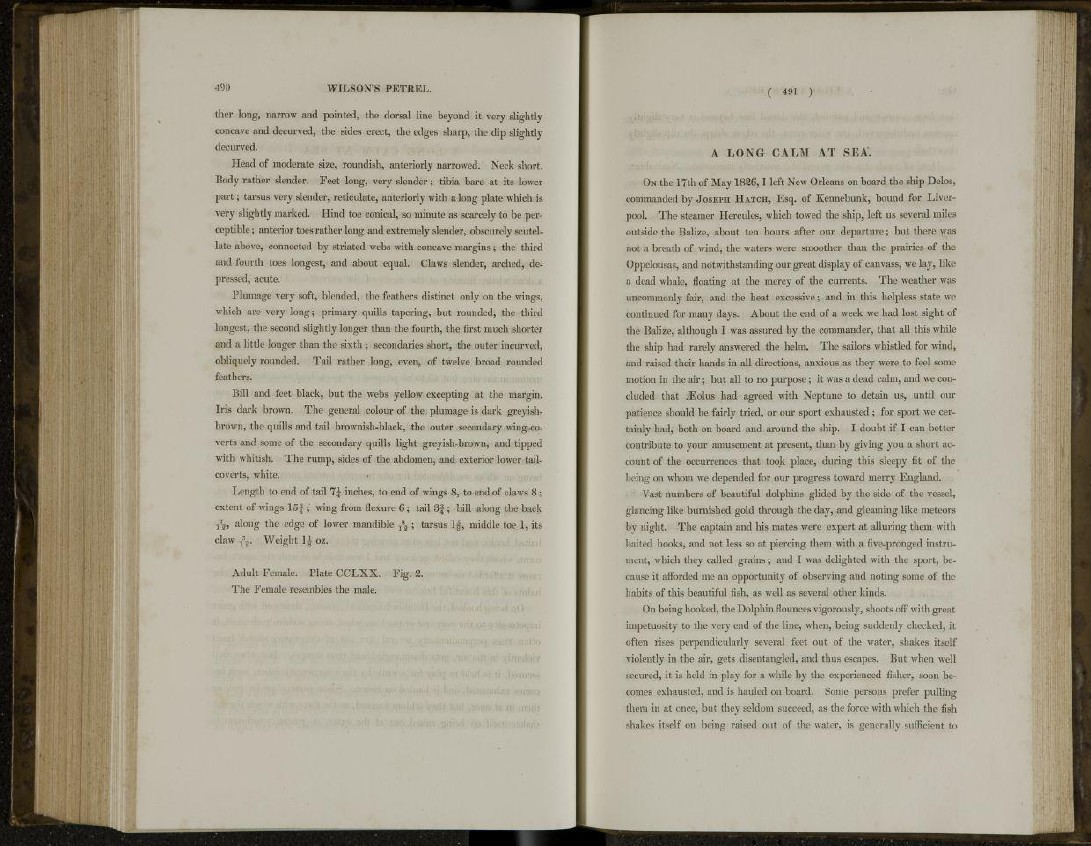
490 WILSON'S PETREL.
ther long, narrow and pointed, the dorsal line beyond it very slightly
concave and decurved, the sides erect, the edges sharp, the dip slightly
decurved.
Head of moderate size, roundish, anteriorly narrowed. Neck short.
Body rather slender. Feet long, very slender; tibia bare at its lower
part; tarsus very slender, reticulate, anteriorly with a long plate which is
very slightly marked. Hind toe conical, so minute as scarcely to be perceptible;
anterior toes rather long and extremely slender, obscurely scutellate
above, connected by striated webs with concave margins; the third
and fourth toes longest, and about equal. Claws slender, arched, depressed,
acute.
Plumage very soft, blended, the feathers distinct only on the wings,
which are very long; primary quills tapering, but rounded, the third
longest, the second slightly longer than the fourth, the first much shorter
and a little longer than the sixth ; secondaries short, the outer incurved,
obliquely rounded. Tail rather long, even, of twelve broad rounded
feathers.
Bill and feet black, but the webs yellow excepting at the margin.
Iris dark brown. The general colour of the plumage is dark greyishbrown,
the quills and tail brownish-black, the outer secondary wing-coverts
and some of the secondary quills light greyish-brown, and tipped
with whitish. The rump, sides of the abdomen, and exterior lower tailcoverts,
white.
Length to end of tail 7£ inches, to end of wings 8, to end of claws 8;
extent of wings 15f ; wing from flexure 6; tail 3f ; bill along the back
T
7
2 , along the edge of lower mandible T
8
2 ; tarsus 1$, middle toe 1, its
claw fa Weight 1£ oz.
Adult Female. Plate CCLXX. Fig. 2.
The Female resembles the male.
( 4 9 1 )
A LONG CALM AT SEA.
ON the 17th of May 1826,1 left New Orleans on board the ship Delos,
commanded by JOSEPH HATCH, Esq. of Kennebunk, bound for Liverpool.
The steamer Hercules, which towed the ship, left us several miles
outside the Balize, about ten hours after our departure; but there was
not a breath of wind, the waters were smoother than the prairies of the
Oppelousas, and notwithstanding our great display of canvass, we lay, like
a dead whale, floating at the mercy of the currents. The weather was
uncommonly fair, and the heat excessive; and in this helpless state we
continued for many days. About the end of a week we had lost sight of
the Balize, although I was assured by the commander, that all this while
the ship had rarely answered the helm. The sailors whistled for wind,
and raised their hands in all directions, anxious as they were to feel some
motion in the air; but all to no purpose; it was a dead calm, and we concluded
that iEolus had agreed with Neptune to detain us, until our
patience should be fairly tried, or our sport exhausted ; for sport we certainly
had, both on board and around the ship. I doubt if I can better
contribute to your amusement at present, than by giving you a short account
of the occurrences that took place, during this sleepy fit of the
being on whom we depended for our progress toward merry England.
Vast numbers of beautiful dolphins glided by the side of the vessel,
glancing like burnished gold through the day, and gleaming like meteors
by night. The captain and his mates were expert at alluring them with
baited hooks, and not less so at piercing them with a five-pronged instrument,
which they called grains ; and I was delighted with the sport, because
it afforded me an opportunity of observing and noting some of the
habits of this beautiful fish, as well as several other kinds.
On being hooked, the Dolphin flounces vigorously, shoots off with great
impetuosity to the very end of the line, when, being suddenly checked, it
often rises perpendicularly several feet out of the water, shakes itself
violently in the air, gets disentangled, and thus escapes. But when well
secured, it is held in play for a while by the experienced fisher, soon becomes
exhausted, and is hauled on board. Some persons prefer pulling
them in at once, but they seldom succeed, as the force with which the fish
shakes itself on being raised out of the water, is generally sufficient to